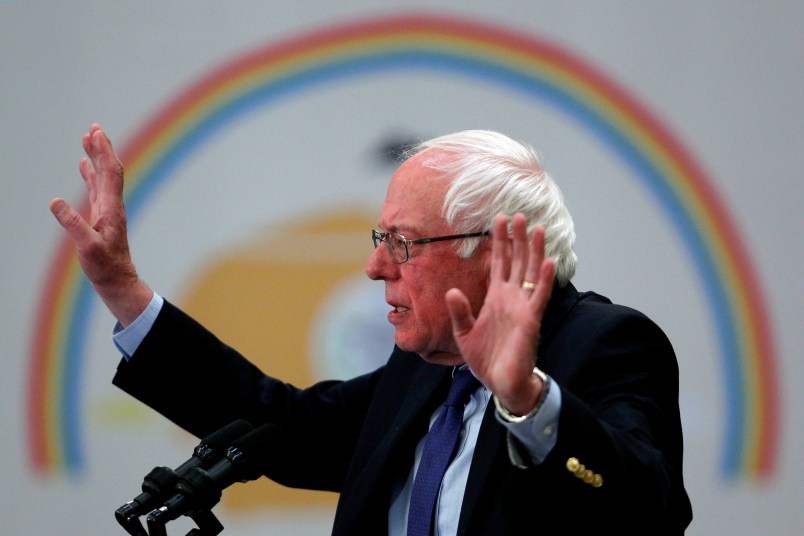Here’s a very interesting article by TPM alum Sahil Kapur on efforts to calm the waters between national Democrats and the Sanders campaign. The gist of it is that while Sanders and his top staffers have been upping the ante against Clinton and pressing their demand to take their campaign all the way to the convention he has also been quietly reaching out to Senate colleagues to reassure them that he understands the stakes involved and has no intention of damaging Democratic party prospects in the fall campaign.
Is this two-faced? Is it all consistent? Does one hand know what the other is doing?
I confess I feel there’s an edifying perspective I got from reading a number of TPM Reader emails last night from exactly eight years – if you didn’t see them, I published a handful of them here last night. The Clinton camp’s line through this campaign has been that there was lots of division in 2008, lots of acrimony. But when it became clear that Clinton couldn’t win, she set about the process of lowering the temperature, eventually endorsing President Obama and then working her hardest in the fall to get him elected. That’s broadly true, certainly in retrospect.
But it wasn’t just that there was a lot of acrimony and lots of so-called ‘PUMAs’ insisting they’d never vote for Obama (virtually all of them eventually did.) But just as things were in fact winding down, Clinton was re-escalating the drama, as Sanders is now. I barely even remembered the 2008 drama about the disqualified delegate slates from Michigan and Florida. But the fact that these votes allegedly (it’s complicated) weren’t being counted become a matter of huge controversy. And just about exactly eight years ago, almost to the day, a lot of TPM Readers were freaking out about a speech Clinton gave basically raising the issue of these ‘uncounted’ votes to a matter of the fundamental integrity of our democracy.
As TPM Reader NK put it on May 22nd, 2008, “By ginning up such strong sentiments that this thing was “stolen” from her – a sentiment that would be laugh-out-loud funny if the consequences weren’t so deadly serious – she is unleashing something that only she can call back. I have been very distressed about this since yesterday.” The same day, TPM Reader CH said: “I too see Clinton’s antics as a way to foment anger and disillusionment among her supporters, and the clear recognition of this gambit is making me feel nauseous.”
So yes, Clinton did eventually help bring the party together and unite around Obama. But she took a pretty circuitous route to that destination. And, as I say, almost to the day eight years ago, she seemed to be putting more and more grievance and democratic principles red meat in front of her supporters, just the time that virtually everyone outside her campaign and not among her most intense supporters realized it was time to start winding things down, lowering the temperature. Yet it was only a couple weeks later, on June 7th, that she suspended her campaign.
Clinton’s campaign isn’t the Sanders campaign. There are numerous differences, not the least of which is that there were not that many policy differences between her and then-Senator Obama. The institutional party’s relationship to her was fundamentally different since she was the ultimate insider.
Still some pretty deep similarities are readily apparent. A candidate can’t just bring their supporters up short after raising expectations and passions so high. There is this process of giving supporters more (making righteous demands, pressing the justice of the case) in the half-realized expectation of needing to fundamentally disappoint them later. There’s a delicate dance the candidate has to play on multiple fronts. I think the key to understanding the real drama is that that drama is playing out within the candidate and the candidate’s top advisors just as much as it is among their many supporters. That creates a lot of contradictory behavior, or seemingly contradictory behavior, and a lot of potentially explosive emotion.
As I wrote a couple days ago, a lot of combativeness, often verging into toxic rhetoric about the party he is seeking to lead, seems to come from Sanders himself. It’s not being kicked up by the aides around him unbeknownst or in spite of him. It’s him. Sanders also comes from a much more confrontational, dissident political heritage than Clinton. But I think the jagged and often wild denouement of the 2008 drama can give us some sense of the complexities that can be involved, the zig zag path to bringing supporters to accept so much less than what they’d hoped for and the for the candidate to come to grips with what their principles, perhaps their principles, seem to dictate they do.






